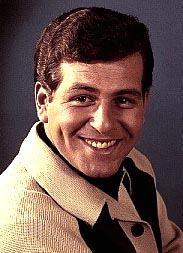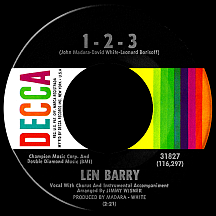LEN BARRY
1-2-3
In case you're thinking singer Len Barry's rise (and fall) came as easily (or 'elementary') as "1-2-3," I have to say it's just not so. His presence (and voice) was felt (and heard) throughout most of the decade, from his breakthrough with The Dovells to his solo career and work behind the scenes. Leonard Borisoff began singing in his hometown, Philadelphia, in 1957 at age 15, forming The Cashmeres with five other Overbrook High School students (Arnie Silver, Jerry Gross, Mike Freda, Jim Mealey and Mark Gordesky). Basing their sound on the rhythm and blues groups of the day, they soon became The Brooktones and spent the rest of the decade performing locally at dances and events. Signed by the city's top hitmaking record label, Cameo-Parkway, the newly-designated Dovells broke nationally with their second release, the undeniable dancer "Bristol Stomp," a top ten hit in the fall of 1961.
Bernie Lowe, Dave Appell and Kal Mann knew a thing or two about making hit records, helping the group rack up a two-year string on Parkway, dance tunes all, including another top ten in '63, a vocal version of The Philip Upchurch Combo's instrumental "You Can't Sit Down." The ongoing dance formula grew tiring for the group members, particularly Len, who quit in late 1963 when the group's popularity had seemingly stalled. The company accommodated him; a couple of singles came out on the Cameo label in 1964, a remake of LaVern Baker's "Jim Dandy" (with Dovells backing vocals) and "Hearts Are Trump," penned by Barry with producer Jimmy Wisner. When these fell flat, he bounced to Mercury for one single, "Let's Do it Again," a retread of "You Can't Sit Down" with totally different lyrics. Success was elusive until 1965, when he made a move that made the difference.
At Decca Records, Len got into a good creative situation with David White of Danny and the Juniors and Johnny Madara (with whom White and Artie Singer had penned the Juniors' chart-topping '58 hit "At the Hop"). The three came up with "Lip Sync (To the Tongue Twisters)," a timely variation on Shirley Ellis's "Name Game" craze and a minor chart single (his first since leaving the Dovells) in the spring of '65. The situation got much better: "1-2-3," the songwriting trio's next effort, was a huge hit for Barry on par with the Dovells' four-year-old breakthrough disc; it reached number two in November while also making a nice showing on the rhythm and blues charts. This crossover success added fuel to Len's belief that he was as soulful a singer as anyone (an idea he'd gotten in '61 when "Bristol Stomp" had similarly impacted R&B radio), a somewhat arrogant attitude not unfamiliar to his former bandmates (heated arguments had often spiraled out of control, hastening Len's departure). He made vocal his resentment of black-formatted radio stations when further releases failed to get played beyond the usual top 40 outlets. Later, Motown songwriters Eddie Holland, Lamont Dozier and Brian Holland threw a wrench into the works, filing a plagiarism suit against Madara, White and Barry, claiming "1-2-3" copied "Ask Any Girl" (a Supremes flip side), a notion exposed as ludicrous when comparing the two recordings side-by-side.

John, David and Len created the follow-up single, "Like a Baby," from a line in "1-2-3" ('...like taking candy from a baby'), scoring a top 30 hit in January 1966. Then Barry tackled "Somewhere" (the showstopping Leonard Bernstein-Stephen Sondheim ballad from West Side Story) and his lively rendition returned him to the top 30 in April. Summer fun song "It's That Time of the Year," penned by Madara, White and Barry with help from future Philly producing legend Kenny Gamble, and "I Struck it Rich" (Len, Kenny and Leon Huff wrote this one), wrapped up an eventful '66. After one final Decca release, Len moved to RCA Victor, kicking things off with "The Moving Finger Writes" (cowritten with Wisner and Eli Tatarsky, whose professional name was Bobby Eli). There were three other Victor 45s and three on Amy through '68 including "456 (Now I'm Alone)," a ballad that, despite its title, has nothing to do with his million-selling numeric-titled hit.
Len switched gears with the instrumental "Keem-O-Sabe" (writer credit going to Bernie Binnick and Len's mother, Bernice Borisoff), intended as a jazzy rendition of a western movie Indian tune (the title means "friend," as frequently used by the masked man and his Indian sidekick Tonto in the TV series The Lone Ranger). Barry produced the full-album project with Philly studio musicians (Eli among them) as The Electric Indian; the single was a top 20 hit in the fall of '69, followed by Chris Kenner and Fats Domino's "Land of 1000 Dances," a minor chart single near year's end. After a few more solo records on Scepter, Buddah and Paramount in the early 1970s, Len Barry seemed to drop out of sight but has continued performing through the years just as two of his former partners, Jerry Gross and Mark Gordesky, have likewise ventured forth under the Dovells name. The three reunited in the early 1990s, but it didn't last; old grudges resurfaced and Len has since insisted he will never work with them again. Perhaps love, as the song says, is as easy as "1-2-3," but working relationships aren't necessarily that simple.


